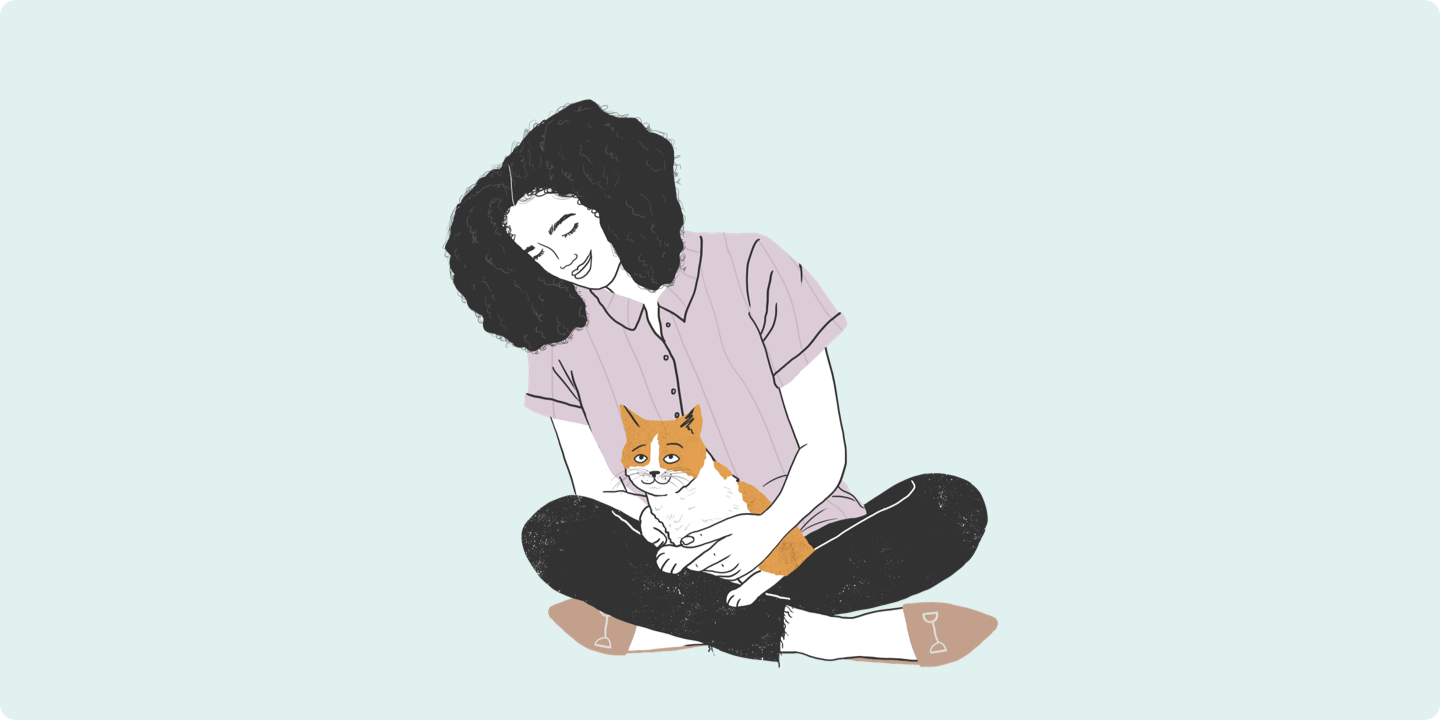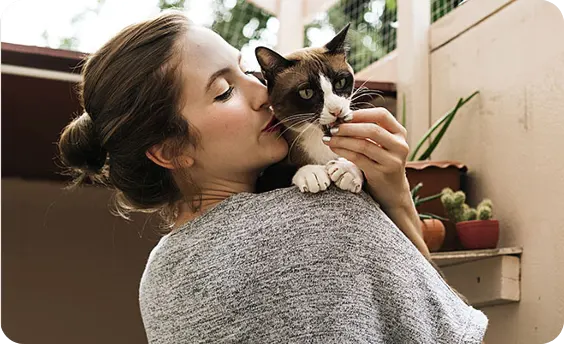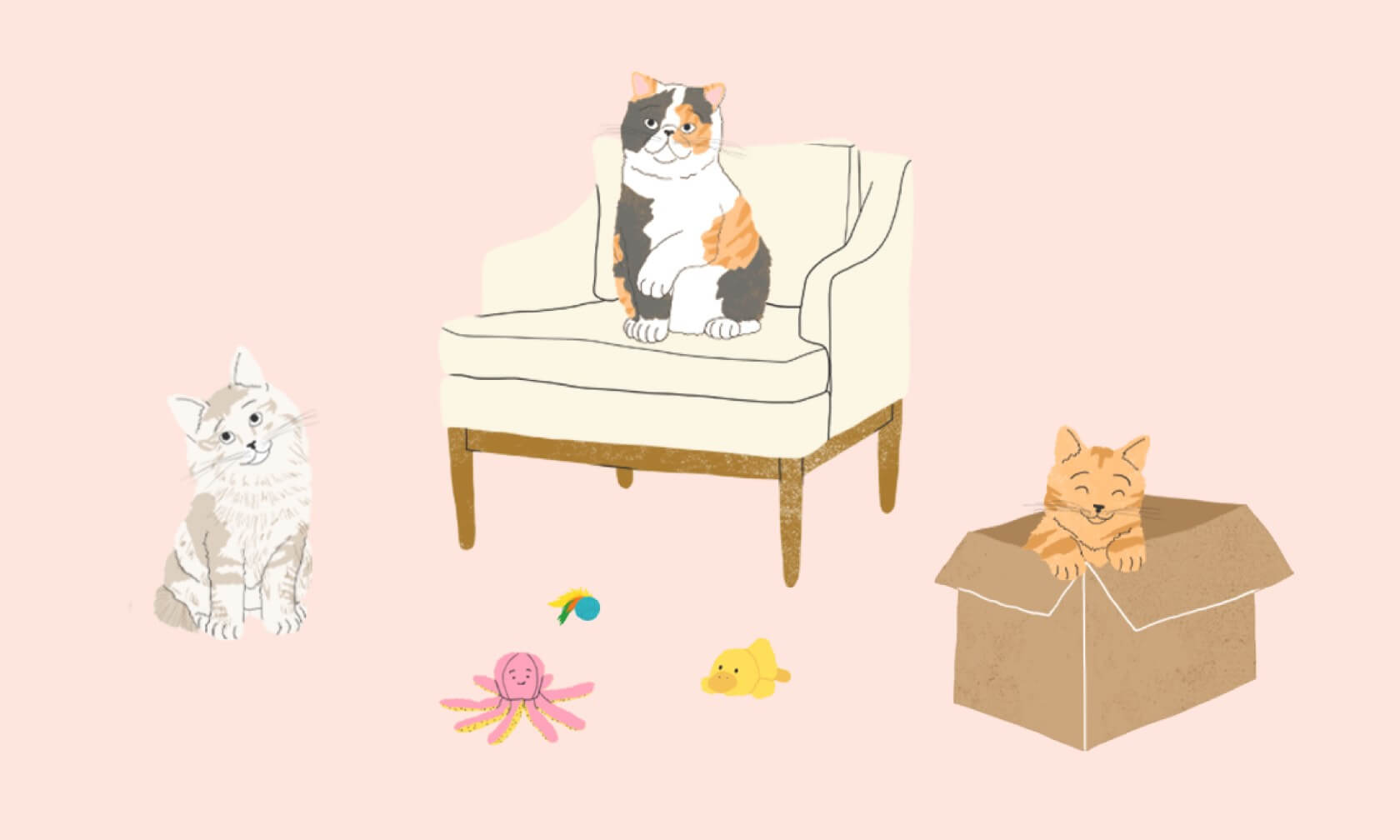Cats are funny creatures. One minute they want their space, and the next, they want to cuddle up on your lap. (Or, they completely ignore you until it’s dinner time.) While it may sometimes seem like your cat couldn’t care less about you, they actually form bonds with us and become attached to us1.
These bonds are mutually beneficial, too. Cat ownership has been found to lower stress2, decrease the risk of allergies in children3, and improve your quality of life. Not a bad deal, right?
If you’re curious how to bond with your cat, especially if they’re not overly affectionate to begin with, you’re not alone. You can take steps to help build trust and a relationship with your cat.
How to Bond With Your Cat
Part of the bonding process is taking the time to learn what your cat likes. Each cat is different. What one cat enjoys, another might not. When trying the following activities, notice what kind of cues they're sending you and remember to respect their boundaries.
Grooming
Brush and groom your cat regularly — if they enjoy it. Forcing grooming can damage the bond you share with your cat if they do not enjoy it. If they do like it though, it’s a great way to spend time together.
Pay Attention to Quality Time
Spend time each day petting, snuggling with, and playing with your cat. But pay attention to your cat's cues — if they want space, give it to them. Your bond will grow if you respect their cues.
Training
It’s possible to train your cat. Working together to train a skill is a great way to build and strengthen the bond you share. You may even impress your friends, too!
Go for a Walk
You can leash train your cat to go on walks or hikes with you. Not all cats will like leash walking, but, for some cats, it can be a fun way to spend quality time together. Just make sure they’re protected with a safe and effective flea and tick preventative prior to exploring the outdoors. Check to see if the product also provides protection from heartworm disease and intestinal parasites, as cats may have increased exposure by being outdoors. And, of course, ensure your cat has an ID collar and/or is microchipped.
Flea and Tick Preventatives
A flea infestation or tick bite can hinder your bond with your cat. Whether your cat is constantly itching, you're finding flea dirt in your home, or finding a tick, these parasites can cause stress and frustration for you both. Using flea and tick prevention can prevent these problems and help you and your cat strengthen your bond. When choosing a safe and effective flea and tick medication, ask your veterinarian about options.
Meal-Feeding
Feeding your cat at specific times during the day, as opposed to free-feeding them, can be an easy way to engage, interact, and spend more time with your cat. It also helps them associate you with one of their favorite things — eating.

How to Protect the Existing Bond With Your Cat
Once you’ve learned how to bond with your cat, you’ll want to protect the bond you share. Certain things can weaken the bond you share with your cat, but you can take steps to keep it strong.
Limit Stress in the Home
Events that cause you to feel stressed (like moving, the holidays, a new baby, or a new pet) can cause your cat stress, too. Try to keep your cat’s routine as normal as possible and respect their need for attention or space.
Be Aware of Cat Illnesses
If your cat becomes ill or has a painful condition like osteoarthritis or dental disease, they may start to act differently, including shying away from you. If your cat is acting differently than normal, they may be sick or in pain. Managing your cat's pain or illness can help them return to their normal selves and allow you to rebuild your bond.
Keep Them Healthy
Bring your cat for their regular wellness check-ups with your veterinarian to help keep them healthy and parasite-free. Take steps to ensure a stress-free trip before you head to the vet.
Watch Out for Inappropriate Behavior
The bond between you and your cat can be strained if your cat is scratching things they shouldn’t or acting aggressively. Providing your cat ample scratching posts, lots of exercise, and respecting their boundaries can help them control their unwanted behavior.
Pay Attention if They’re Going Outside Their Litter Box
If your cat is peeing or pooping outside of their litter box, it can mean a medical problem, stress, or a problem with their litter box set up. Whatever the cause, it can certainly damage your bond with your cat. Be sure to provide them with an ample number of litter boxes (one more than the number of cats you have) and take steps to decrease stress. If those steps don’t work, it’s time to talk with your veterinarian to see if there may be a medical reason.
If you detect a change in your cat’s “normal,” don’t hesitate to seek professional veterinary care.
ZPC-00432R3
IMPORTANT SAFETY INFORMATION: The safe use of Revolution Plus has not been established in kittens less than 8 weeks old or in breeding, pregnant or lactating cats. Reported side effects in clinical trials included lethargy and anorexia. Use with caution in cats with a history of neurologic disorders. Revolution Plus contains sarolaner, a member of the isoxazoline class which has been associated with neurologic adverse reactions, such as tremors, ataxia, and seizures in cats with or without a history of neurologic disorders. In humans, Revolution Plus may be irritating to skin and eyes. See Prescribing Information.
REVOLUTION PLUS is indicated for the prevention of heartworm disease caused by Dirofilaria immitis, the treatment and control of roundworm (Toxocara cati) and intestinal hookworm (Ancylostoma tubaeforme) infections, and the treatment and control of ear mite (Otodectes cynotis) infestations. REVOLUTION PLUS kills adult fleas (Ctenocephalides felis) and is indicated for the treatment and prevention of flea infestations, the prevention of Dipylidium caninum (tapeworm) infections as a direct result of killing Ctenocephalides felis vector fleas on the treated cat, and the treatment and control of tick infestations with Amblyomma americanum (lone star tick), Amblyomma maculatum (Gulf Coast tick), Dermacentor variabilis (American dog tick), and Ixodes scapularis (black-legged tick) for one month in cats and kittens 8 weeks and older, and weighing 2.8 pounds or greater.
- Vitale, K. et.al. Attachment bonds between domestic cats and humans. Current Biology, Volume 29, Issue 18, 2019, Pages R864-R865.
- Allen, K. Cardiovascular Reactivity and the Presence of Pets, Friends, and Spouses: The Truth About Cats and Dogs. Psychosomatic Medicine 64:727–739 (2002): 727-39.
- DR Ownby et al. Exposure to dogs and cats in the first year of life and risk of allergic sensitization at 6 to 7 years of age. Journal of the American Medical Association 288(8): 963-72 (2002).




